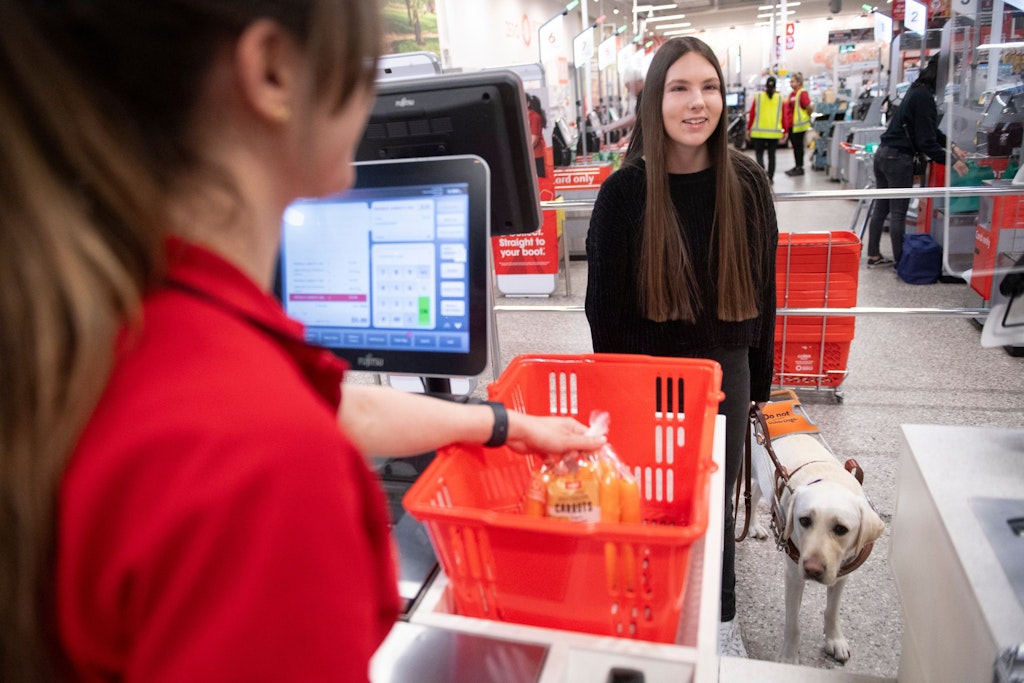How your next shopping trip could support people with disability
![Coles team members Caitlin and Rabi with puppy-in-training Orion. [Source: Coles Group]](https://agedcareguide-assets.imgix.net/news/articles/wp/Colesguide__0205.jpg?fm=pjpg)
Guide Dogs take time and money to raise, but it has never been easier to show support.
Key points:
- Until Tuesday, May 21, Coles will donate five cents to Guide Dogs when customers purchase a dog food product in-store and on Coles Online
- The campaign excludes the purchase of pet accessories and treatments, with a maximum cap of $300,000 dollars
- It takes two years and over $50,000 dollars to breed, raise, train and match a suitable Guide Dog with a person with low vision, according to Guide Dogs Victoria
Coles Group has started a national fundraising campaign for Guide Dogs to help support Australians living with low vision or blindness.
It’s estimated almost 70 Australians a day will be diagnosed with a severe vision condition by 2030 and the number of people with low vision is expected to grow as the national population ages.
Funds raised will help support the work of Guide Dogs to continue to breed, raise and train Guide Dogs across Australia, like Isla who supports 21-year-old Karlee from Shoalhaven, New South Wales.
Karlee, who was born legally blind, said having Guide Dog Isla by her side has given her freedom and independence to thrive and navigate the world around her.
“Before receiving my Guide Dog, my independence was limited and I felt extremely restricted and isolated. My world was getting darker and [it] really felt like it was shrinking; even leaving my house independently was a challenge and filled me with fear and anxiety,” she said.
“When I got my first Guide Dog, Olympia, I experienced freedom for the first time. Olympia has since retired and last July I was matched up with Isla who allows me to leave my house with confidence and truly has opened up my world so much.
“The bond I share with Isla is so special and like no other. We trust each other immensely and have a deep level of communication, which allows us to work together as a team. Isla has given me the gift of independence, freedom and constant companionship which I am forever grateful for.”
Legally, a Guide Dog can go anywhere to support a person with low vision. When working in a harness, a Guide Dog should not be touched, fed or distracted from guiding its handler.
“Due to my lifestyle, I required a very confident and adaptable dog who could work well in a range of dynamic environments,” Karlee said.
“Personality was another big factor involved in matching. Both me and Isla have very similar personalities. We thrive on being active and love exploring new places.”

Customers can also support Guide Dogs by ‘feeding’ a Donation Dog with loose change at a Coles supermarket or selected Liquorland and First Choice Liquor Market store year-round.
Coles Group Head of Culture and Inclusion Katie Wyatt said Coles is delighted to expand its support for Guide Dogs through the new fundraiser.
“Coles is always looking at ways to make the shopping experience — both in-store or online — for our customers more accessible and inclusive and we are proud of our long-running partnership with Guide Dogs to improve access for Australians living with low vision or blindness,” she said.
“Together with our customers, Coles has already raised more than $14 million over 40 years through initiatives such as the Donation Dogs at the front of our supermarkets and Liquor stores.”
Dr Russell Harrison, Guide Dogs general manager of dog and vision services, said funds raised will support the organisation.
“Creating a world that is accessible and inclusive for people with low vision or blindness is only possible with support from organisations like Coles,” he said.
Before funding an assistance animal, the National Disability Insurance Agency will consider whether an assistance animal is a reasonable and necessary support that will meet your needs and help you pursue your goals.
To consider if an assistance animal is a reasonable and necessary support, the NDIA requires evidence in writing with input from all of the following:
- a registered assistance animal provider;
- an allied health professional;
- the participant.
What questions would you like answered about Guide Dogs? Let the team at Talking Disability know and subscribe to the newsletter for more information, news and industry updates.
Related content: